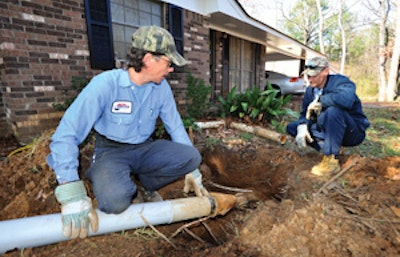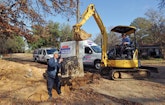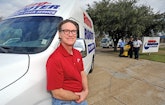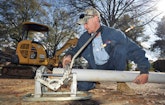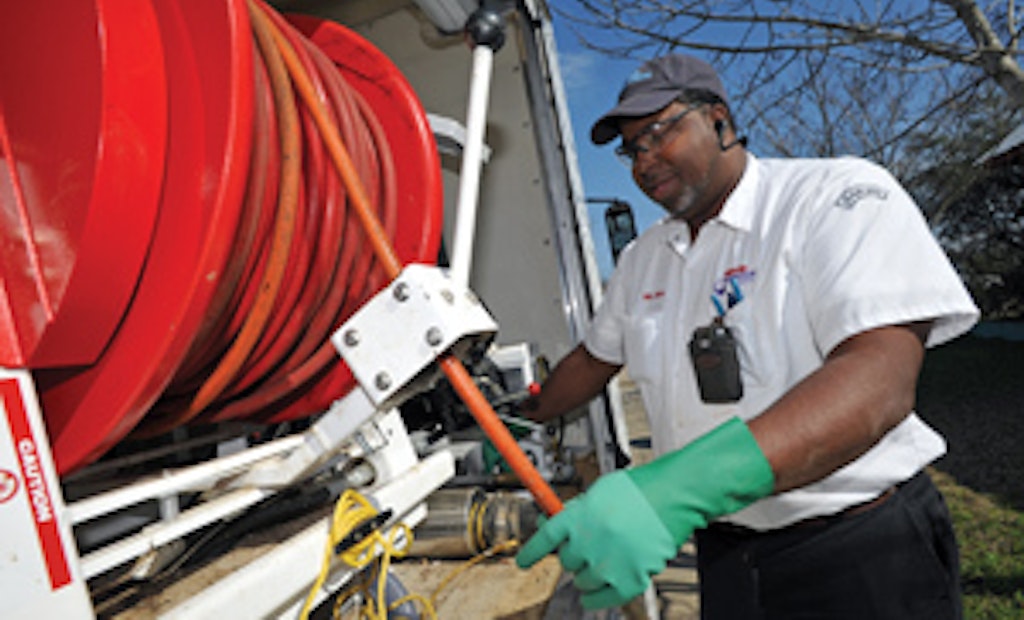
Interested in Inspection?
Get Inspection articles, news and videos right in your inbox! Sign up now.
Inspection + Get AlertsSince purchasing a Roto-Rooter franchise in 1982 in Jackson, Miss., Paul Berlin has not hesitated to buy new equipment and jump into new services when presented with the opportunity to advance the scope of his operation.
Berlin demonstrated his willingness to take the plunge into new technology in 1990 when he expanded into pipe bursting. In 2007, he helped his company’s bottom line with the addition of CIPP lining. With a current compliment of 12 employees (three in the office, two helpers and seven technicians), Berlin would be happy to see those numbers grow but he feels comfortable with his position in the current economy.
Prior to 2002, he had 14 technicians and 14 service vans, but he believes downsizing while continuing to offer a broad selection of services for his residential and light commercial customer base has been a plus over the years.
Currently, the company operates on a 6-acre site with a 4,000-square-foot office and warehouse facility. Twenty-five percent of gross revenue comes from these added capabilities, 40 percent from drain cleaning and 35 percent from CCTV and jetting.
Berlin now finds his company ready to respond to most demands at a time where cast iron and PVC systems in the Jackson area are deteriorating due to ground shifting, decaying pipe and stoppages. He has a well-trained crew for general plumbing and drain cleaning, and four of the seven technicians are experienced in jetting, pipe bursting and relining.
Pulling the cart
Berlin purchased a jetter from US Jetting in 1982 and became one of the first to offer jetting in the Jackson area. The service has provided what Berlin calls an “up-sale” opportunity, meaning the potential for more work on a job.
“Our man goes out to a residence and finds roots in the line,” Berlin says. “The jetter will go in and clean out the roots, and this makes the customer happy. Having the jetter can add $100 to the total bill. To be honest, this is a huge benefit to us and it is a benefit for our customer, and today you have to give the customer the full service the jetter provides. You clean the line, and then you offer the other options depending on the conditions. Plus, when we use our new jetter, we increase the guarantee we give our customers.”
The most recent purchase from US Jetting is a 4018-300 curbside 12-foot box enclosure, mounted on an Isuzu chassis, producing 4,000 psi/18 gpm with a 300-gallon water tank. Their second US Jetting unit is a 4018-300 single-axle trailer with 4,000 psi/18 gpm and a 300-gallon water tank. Each unit has 500 feet of 1/2-inch hose. Berlin also likes the Warthog WS-1/2 nozzle from StoneAge, used with the jetter, which is particularly effective at removing grease and roots.
“Our drain cleaning service man with the combo unit has seen sales rise 35 percent,” says Berlin. “We hope to add a second combo unit in 2012.”
Other equipment includes a mix of seven 2006 Ford and Chevrolet vans, plus a 2011 Nissan commercial van; one Komatsu PC27MR-2 hydraulic excavator; and three MyTana Mini Stand-Alone Complete (MSA-Com) camera units for 1- to 3-inch lines. There are also four SeeSnake Compact cameras, seven SeeSnake NaviTrack Scout locators, and one SeeSnake NaviTrack II locator, all from RIDGID.
Eyes on the prize
In 1995, Berlin was again ahead of the curve becoming one of the first in the area to include CCTV. Another push for CCTV came about in 2008 with the ability to televise larger lines with the Pearpoint P350 flexitrax system, a portable pan-and-tilt crawler for 6- to 24-inch lines. He also uses a Pearpoint P332 flexiprobe system for 4-inch lines.
“The majority of CCTV is with the 2- and 4-inch lines,” Berlin says. “Anytime we do a drain call and clear the line we offer to televise the line at no charge for the customer. This is where we can show where something is wrong in the line. They can see it on the screen.
“We do have a release form that we ask them to sign, as these cameras can get hung up in a bad line. We let them know through this form that if we have a problem in retrieving the camera they will bear the cost of retrieval. They are made aware of the risk and this obligation. Ninety-five percent of the time they will sign the form. There is no cost for televising the line, but we might find a problem that needs to be addressed.”
Adding the Pearpoint cameras provided Berlin the capability to inspect larger lines, and although there are not as many opportunities to use this equipment, having a portable system that doesn’t require a dedicated van has been an advantage. The Pearpoint cameras have helped the company broaden its customer base by providing the ability to televise lines in apartment complexes and similar structures, manhole lines, as well as small industrial or commercial establishments.
“To be honest, this is not a big portion of business, but we hope to see an increase as the word gets out,” Berlin says.
He says they also use the release form when using these cameras, which again puts the burden of retrieval on the customer.
Leading the way
When Roto-Rooter of Jackson first offered pipe bursting, customers were astonished that there was a pipe repair option that wouldn’t tear up their beautiful yards or destroy their concrete driveways.
“Now we just have two holes in the ground and the landscape or driveway is undisturbed. This has worked very well for us,” he says.
Berlin notes that while they have burst lines as long as 500 feet, lines in residential properties typically are only 50 to 100 feet in length.
Berlin originally purchased TRIC Tools’ C25, a 30-ton unit that saw extensive use and was eventually replaced with TRIC’s upgraded X30. The original purchase included the BC60, used for larger lines. That unit, which TRIC later renamed the X60, is still in service. Both operate off 10,000 psi. Berlin also outfitted a Wells Cargo 12-foot trailer complete with a 20 hp Honda GXV620 engine.
TRIC Tools has always provided Berlin with good service, and he recalls one of the most challenging experiences with a pipe bursting job, and one where TRIC provided some assistance. They were doing a 4-inch line that extended about 400 feet under a plywood factory where there were huge machines on the concrete floor. All went well until they hit concrete that had been poured around the line years before.
“This would have been a mess if we could not get through. Ward Carter [inventor and founder] of TRIC came out to keep us calm and focused and at the third pull we got it through. I don’t want to think about what could have happened. It would not have been a pretty picture, but it worked out. In fact every job we have done has worked – gone smoothly.”
Growing stable of services
Once he had established a high level of comfort with pipe bursting, Berlin saw that some jobs would benefit from the addition of relining, so he turned to Global Pipeline Systems, adding the company’s lateral lining system and a custom-built, 18-foot Global Pipeline trailer.
“Most often we use relining for under a slab, and this has been good for us,” Berlin says. “Again, our customers were unaware of this technology. We had to educate them as to how it works. We have a DVD that we will show. And it’s not for every job, but a customer would much prefer to have a pipe relined than to see the concrete floor in their house busted up. Again, the cost is not that much greater and there is not the tearing up of the floor.
“If we see the line has become separated under the slab, we show the customer and they know they have to get this fixed. They have the choice of taking the slab out or going under the house. We shoot the liner from outside the house back up under the house and when done it is like a brand-new pipe. It works great. We have had training and service from Global.”
For every job, there is an understanding within the contract that if something happens beyond their control, and they have to dig, the customer will bear some responsibility for additional charges, but that has never happened. Berlin says they have had some challenges, but these systems have proven entirely reliable.
Overall, Berlin sums up his view after operating the company for 30 years, adding services and carving out an important niche, by saying there is a lot of opportunity in servicing smaller lines. He believes those who are taking care of lines out in the street, the bigger stuff, are in an entirely different ball game, and anyone in the business, or new to the business, should not confuse the two. For this company, they know their market, they know their skills, they value their customer base, and they are at a comfort level in terms of their products and their profession.
